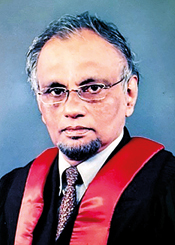Appreciations
View(s):An incredible journey from Sinharaja to Pera
Prof. N. D. Samarawickrame

Prof. N. D. Samarawickrame
We owe our existence to a string of unforeseeable events, repeated arbitrary fortune. My father was born in a rural part of the country. He was the eldest of ten siblings who transitioned out of the village. The privileged upbringing and opportunities I had stand in stark contrast to his experience. That I exist is a tribute to his journey.
The journey from a spirited child growing up in the shade of the Sinharaja, to an economics professor in lifetime service of the hallowed institution in the Hantane valley is replete with coincidences. From having a chance to attend school, deciding to compete at the university entrance exam, entering Peradeniya, placing for overseas post-graduate work, and accepting an academic position at Peradeniya – he rolled with the tide, never afraid of new adventures.
Growing up in an area only accessible by footbridges that crisscrossed the Gin Ganga, his early childhood was idyllic. Days filled with helping out in paddy fields, climbing trees, and swimming in streams with friends. Getting an education required a four-mile walk to find transport to the nearest school. And so his destiny was to become a farmer, a natural vocation for that village. But he was evidently a handful at home and a decision was made to send him away to live with his maternal uncle, to be educated. His uncle’s generosity allowed my father to first attend Pallegama Maha Vidyalaya and later Deniyaya Central College, with home visits for school vacations.
The quietude and discipline at his uncle’s house fostered a lifelong symbiotic relationship with education. In an era of poverty, malaria, no running water and no electricity, to say that Dr. C.W.W. Kannangara’s 1944 educational reforms were pivotal in my father’s life is no exaggeration. The success of the central college system in Sri Lanka propelled him and many of his colleagues to greater heights. Interestingly, my father had an elegant grasp of the English language in secondary school. English medium education and testing was still available outside of private schools during his time. Unfortunately, this changed with the disastrous 1956 language policy. My father often spoke fondly about the important role of his English teacher at Deniyaya Central.
He entered university in the 1960s during what was undoubtedly a golden era of Sri Lankan university life. Comfortable hostel rooms, fulsome served meals, an enlightened teaching faculty eager to foster learning in the best traditions of Western education, and picturesque facilities – a Utopia. As he recounted to me, he travelled alone by bus to Peradeniya to start his studentship, having left home via Galle and made a pit stop for the night in Colombo. It was the first time he had been beyond Colombo. His initiation into university life started as he arrived at Galaha junction. On the instructions of seniors, he rolled up his trousers and walked all the way to the Arts Faculty with his suitcase on his head. A few days later, he was in a group that got locked up overnight in the Medical Faculty anatomy dissection room. Peradeniya was a whole new world for him.
The opportunity to study at the University of Peradeniya was a game changer for my father. After graduation he spent time studying and working overseas, but kept coming back to Peradeniya. And so began a lifelong relationship with the institution and the location. He rose through the ranks of academia, settled down close by, and was an active contributor to the university even in retirement. Then came his untimely and most unfortunate passing, for he
was fit as a fiddle for his age.
It was a perfect storm that led to his demise. The first strike was receiving the SinoPharm COVID-19 vaccine followed by an extended wait for a booster dose. The second was the Omicron variant sweeping across the country. Third, inadvertently receiving the booster dose while at the
onset of a COVID-19 infection, thereby making him ignore symptoms as normal side effects of the booster. This delayed presentation to hospital.
Watching my father slip away over the course of a week, so close and yet so distant, was agonizing. COVID era regulations dictated my father be in isolated care. Fortunately, my brother was the designated in-ward caregiver and was able to comfort my father through his last moments. While my brother and I could understand what was unfolding, preparing my mother was a difficult proposition. She had last seen my father walking out of the house under his own power to see the doctor. I don’t know how or why, but she seemed to steel herself to the outcome.
COVID era regulations meant that funeral arrangements had to be completed within a day; the body held at the hospital in a closed casket and transported to the crematorium by hospital staff. Family and friends didn’t get time or space to grieve. It didn’t need to be that way. The pain of having to say our goodbyes in a rushed and impersonal environment is something we share with countless other families who had to endure the same.
In Sri Lanka, in 1950, an estimated 13% of children would die on average before reaching five years of age. In a remote corner of the Sinharaja, in 1943, that statistic was most probably higher. My father’s work ethic and determination needed fortune and opportunity. The odds were not in his favour. That he became the person he was leaves me in awe. One year since his passing the void still remains.
- Sachithra Samarawickrame
Searching for an ideal partner? Find your soul mate on Hitad.lk, Sri Lanka's favourite marriage proposals page. With Hitad.lk matrimonial advertisements you have access to thousands of ads from potential suitors who are looking for someone just like you.


